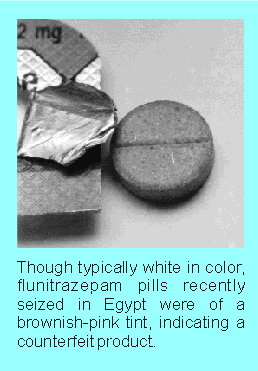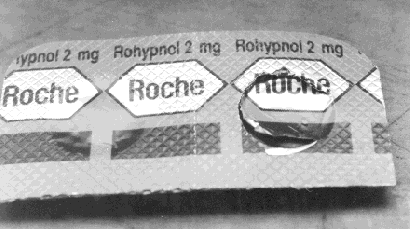Drug Enforcement Administration
Flunitrazepam - Rohypnol
![]() DRCNet Response to the
DRCNet Response to the
Drug Enforcement Administration
Flunitrazepam - Rohypnol
Introduction
Recent seizures and anecdotal reporting indicate that distribution and abuse of
flunitrazepam are increasing domestically, especially in southern and southwestern States.
Of particular concern is the drug’s low cost, usually below $5 per tablet, and its
growing popularity among young people. Flunitrazepam is a benzodiazepine that is used in
the short-term treatment of insomnia and as a sedative hypnotic and preanesthetic
medication. It has physiological effects similar to diazepam (commonly known by its trade
name, ValiumŪ), although flunitrazepam is approximately 10 times more potent.
Flunitrazepam neither is manufactured nor sold licitly in the United States. It is
produced and sold legally by prescription in Europe and Latin America. The drug usually is
smuggled into and transported within the United States through the mail or delivery
services.
Manufacture and Distribution
Flunitrazepam—marketed under the trade name Rohypnol—is manufactured worldwide,
particularly in Europe and Latin America, in 1- and 2-milligram tablets by Hoffman-La
Roche, Inc., a large pharmaceutical manufacturer. However, the drug neither is
manufactured nor approved for medical use in the United States.

Flunitrazepam has been encountered by U.S. law enforcement agencies in Southern States
from California to Florida. Authorities in Texas and Florida have observed the most
significant activity involving flunitrazepam. Distributors in Texas reportedly travel to
Mexico to obtain the drug. In South Florida, the drug is delivered primarily from Colombia
via international mail services or commercial airlines. Overnight mail appears to be the
preferred method of importation. Several packages seized in Miami over the past 2 years
were shipped from Cali, Colombia, and contained up to 11,000 dosage units each.
The most recent and largest seizures of flunitrazepam occurred in February 1995. On
February 13, over 52,000 tablets, packaged loosely in plastic bags and located inside a
car door, were seized by the State Police in Louisiana. On February 14, the U.S. Border
Patrol in McAllen, Texas, seized over 57,000 tablets of Rohypnol, packaged in bubble
packs, along with 53 pounds of marijuana. The drugs were obtained in Mexico and destined
for Florida. Since 1990, over 1,000 Federal, State, and local investigations have been
initiated regarding flunitrazepam. The DEA is pursuing over 70 investigations involving
distribution of flunitrazepam. In many investigations, flunitrazepam was seized along with
other illegal substances, including cocaine and marijuana.

Use and Effects
Flunitrazepam is ingested orally, frequently in conjunction with alcohol or other drugs,
including heroin. The drug’s effects begin within 30 minutes, peak within 2 hours,
and may persist for up to 8 hours or more, depending upon the dosage. Adverse effects
associated with the use of flunitrazepam include decreased blood pressure, memory
impairment, drowsiness, visual disturbances, dizziness, confusion, gastrointestinal
disturbances, and urinary retention. Paradoxically, although the drug is classified as a
depressant, flunitrazepam can induce excitability or aggressive behavior in some users.
Flunitrazepam use causes dependence in humans. Once dependence has developed, abstention
induces withdrawal symptoms, including headache, muscle pain, extreme anxiety, tension,
restlessness, confusion, and irritability. Numbness, tingling of the extremities, loss of
identity, hallucinations, delirium, convulsions, shock, and cardiovascular collapse also
may occur. Withdrawal seizures can occur a week or more after cessation of use. As with
other benzodiazepines, treatment for flunitrazepam dependence must be gradual, with use
tapering off.
Flunitrazepam is touted as an effective “parachute” or remedy for the depression
that follows a stimulant high. Reports indicate that flunitrazepam is used by drug addicts
in Spain and Malaysia to allay withdrawal symptoms and to gain a state of oblivion. Abuse
of the drug in Western Europe and the Caribbean has been reported over the last 10 years.
In Germany, Roche recently removed the 2-milligram dosage from retail
distribution—restricting it to hospital use only—due to the increasing abuse of
flunitrazepam in that country.
In the United States, flunitrazepam is used widely in Texas where it is popular among high
school students. Flunitrazepam is reported to be readily available in the Miami area, and
epidemiologists from that area have stated that it is South Florida’s fastest growing
drug problem. Additional reports from Miami indicate that the largest and fastest growing
group of flunitrazepam users are high school students who take the drug with alcohol or
use it after cocaine ingestion. Two common misperceptions about flunitrazepam may explain
the drug’s popularity among young people: first, many erroneously believe that the
drug is unadulterated—and therefore “safe”—because it comes in
presealed bubble packs; second, many mistakenly think its use cannot be detected by
urinalysis testing.
Flunitrazepam is sold under the trade name Rohypnol, from which the street name
“Rophy” is derived. In South Florida, street names include “circles,”
“Mexican valium,” “rib,” “roach-2,” “roofies,”
“roopies,” “rope,” “ropies,” and “ruffies.” Being
under the influence of the drug is referred to as being “roached out.” In Texas,
flunitrazepam is called “R-2,” or “roaches.”

Scheduling
In 1983, flunitrazepam was placed into Schedule IV of the 1971 United Nations Convention
on Psychotropic Substances. To comply with the convention, the United States placed
flunitrazepam in Schedule IV of the Controlled Substances Act of 1970 (CSA), despite
little evidence of its abuse. In March 1995, flunitrazepam was moved to Schedule III by
the World Health Organization, requiring more thorough record keeping on its licit
distribution—the first benzodiazepine to require more rigid controls. However, due to
recent increases in seizures and abuse of this drug, DEA currently is reviewing the
possibility of placing flunitrazepam into Schedule I of the CSA. A Schedule I drug is
considered to have a high potential for abuse, to have no currently accepted medical use
in treatment, and to lack accepted levels of safety for use under medical supervision.
Outlook
The distribution and abuse of flunitrazepam, in all likelihood, will continue to increase
within certain segments of society in the United States, particularly among abusers of
other illicit drugs and high school students who mistakenly believe that the drug is
harmless. Of greatest concern to drug law enforcement authorities is the involvement of
cocaine and marijuana traffickers in the distribution of flunitrazepam. Polydrug
traffickers increasingly are smuggling the drug into the country and distributing it
through their established illicit channels. The DEA will continue to monitor this emerging
threat and to work to reduce the availability of flunitrazepam in the United States.
Travel back to the DRCNet Response to the DEA Home Page
Travel back to the List of DEA Publications
Travel back to the List of Intelligence Reports